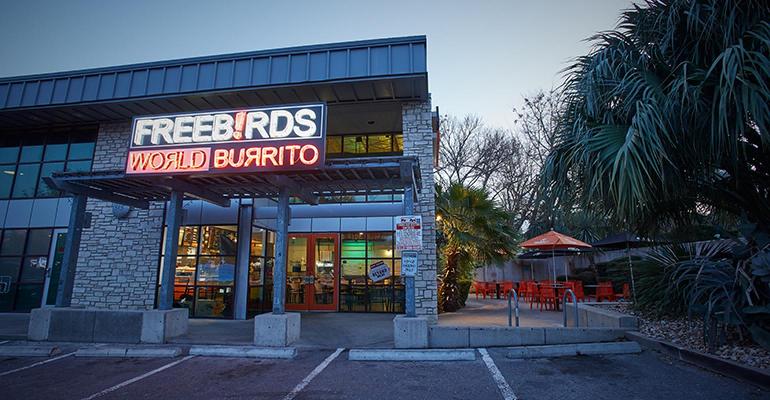When Alex Eagle was named Freebirds World Burrito CEO in 2017 (first as interim), his initial priority was to lead a true operational turnaround. Although Eagle’s background is legal and not operations, he was optimistic about the task at hand.
“I knew I could see the business through a different lens and with a fresh perspective,” he said during a recent interview. Eagle noted that he’s long been inspired by a Jim Sullivan quote, “the best leaders have all the right questions, not the answers.”
“I came in asking all kinds of questions and we went from there,” he said.
Eagle, armed with an added degree in data analytics, dove maniacally into consumer insights, financial metrics, social listening, etc., noting "that is how we could really get on top of how we were performing."
How the company was performing wasn’t how he wanted the company to be performing; store-level margins were below 6%, average unit volumes were around $900,000, and sales and unit counts were declining.
“The business was losing a lot of money. We knew we had to get back to the fundamentals and just get stronger at the basics,” Eagle said.
During Eagle's first several years, the company sharpened its focus on infilling Texas markets (its home state) and “eliminating the distractions” that came from other markets that may have stretched distribution capacity. That came with a systemwide retrenchment accelerated around that 2017-18 timeframe. Freebirds has since started to grow again an, according to Technomic Ignite data, the company finished 2023 with 64 locations, a 3.2% bump from the prior year. In doing so, the company has prioritized consistency, cleanliness, and service while beefing staffing levels back up using incentives like higher pay, daily pay, and reward recognitions. The company’s enhanced benefits program focuses on “mind, body, wallet,” or what is available for mental wellness support or financial literacy, for instance.
“We have a long list of employee propositions. Being best-in-class means trying to get a little better each year and setting the bar higher. We don’t come out of the box perfect, but we improve our proposition each year,” Eagle said. “The quality of talent we’re attracting has very much improved. But there is still more to do.”
Freebirds has also enhanced its tech stack, hiring a chief technology officer in 2021 to drive a shift to first-party ordering, a point-of-sale upgrade, new learning management system, and more. And, the company got itself back into new product launches and limited-time offers. The LTO cadence started with a brisket launch, followed by prime rib and, most recently, birria. All three mixed in double digits, Eagle said, which has created even more momentum for the company.
Then, there were the operational improvements – the North Star of the brand’s turnaround. Freebirds went through a recipe and equipment overhaul to simplify the business. The kitchen went from five pieces of equipment to two, for instance, while some recipes went from 25 steps written down to three steps with photos. Sauce prep was moved out-of-house, as was the chip-making process and the blending and portioning of spices, alleviating all of that work for employees.
“We have proven that when you make those types of changes, you don’t need to have the food quality go down,” Eagle said. “We actually have more consistent food, which creates a better experience for guests. We’ve had a very consistent performance and it’s because we became focused on systems, processes, training, and people; professionalizing the business so it functions more like an enterprise.”
Professionalizing the business also includes creating a dedicated team. When Eagle started in 2017-18, it was just him and a CFO. Now, Freebirds has executives overseeing operations, people, marketing, tech, facilities and construction, and legal.
“Having a team in place has helped us get to where we are. We’re in a good moment,” Eagle said.
All of Freebirds’ behind-the-scenes work has created this “moment,” and has driven significantly higher unit economics as well. Eagle said average unit volumes are about $1.3 million while top performing restaurants are exceeding $2 million. Additionally, margins are performing in 16% territory, a material increase since his early days with the company. The goal is to get to 20% and he is confident the company will get there.
“We’re not done. We have a clearly detailed roadmap on how to optimize the business,” Eagle said. “We’re at the 50-yard line with our initiatives to professionalize the business.”
Contact Alicia Kelso at [email protected]




